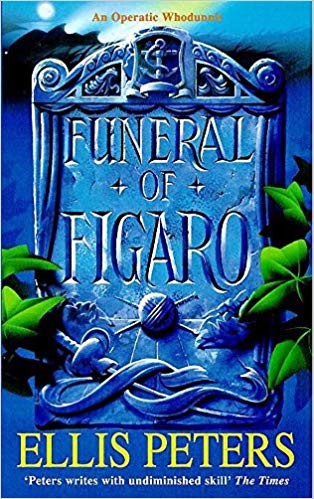
I am always a pushover for mysteries set in the theatre, and here’s another one. Funeral of Figaro by Ellis Peters (Morrow, 1964) is one of the few nonseries books released by Peters, best known for her Brother Cadfael historical mysteries. It is built around the Mozart opera The Marriage of Figaro, which is part of the Mozart series the Leander Theatre in London is presenting that season. The original lead for the opera was killed in a plane crash, and it is sheer luck that the Leander was able to book the world’s best-known Figaro, Marc Chatrier, who was suddenly at loose ends due to a last-minute cancellation.
Rehearsals are going well and everyone is convinced the production will be outstanding. Chatrier is the consummate professional but his arrival has set the cast and the staff on edge without anyone understanding why. Johnny Truscott, the owner of the Leander, is convinced he recognizes Chatrier but can’t think from where. In the midst of this general tension, Johnny’s daughter Hero, who plays the role of the page, decides to use Chatrier to make the up-and-coming young baritone playing the count notice her. Chatrier is all too happy to oblige; Hero is an only child and stands to inherit her father’s millions. Chatrier sees a comfortable retirement haven for himself. Johnny is well aware of Chatrier’s conniving, and blistering confrontations between Chatrier and Johnny, between Hero and Johnny, and between Hero and the young baritone result.
Despite the personal strains, opening night launches flawlessly. The cast and musicians deliver a world-class performance until the fourth act, when the body of Chatrier as Figaro is discovered on the stage with a dress rapier plunged into his back.
Inspector Musgrave, who was in the audience, takes over the homicide investigation. He is not a sympathetic character, as he is an opera buff and has many criticisms of the theatre’s casting decisions, staging, music, etc. He actually has the temerity to state he prefers Wagner to Mozart to the horror of all who hear him. He haunts the theatre early and late without ever saying what he is looking for, and the staff grow to dread seeing him. Matters come to a head when one of the staff attempts to kill the inspector.
An intriguing plot, not at all a police procedural. Inspector Musgrave is something of a jerk, unusually enough. I found myself rooting for the cast and the staff of the Leander. Any reader unfamiliar with the casting and production of The Marriage of Figaro will find the book an excellent primer.